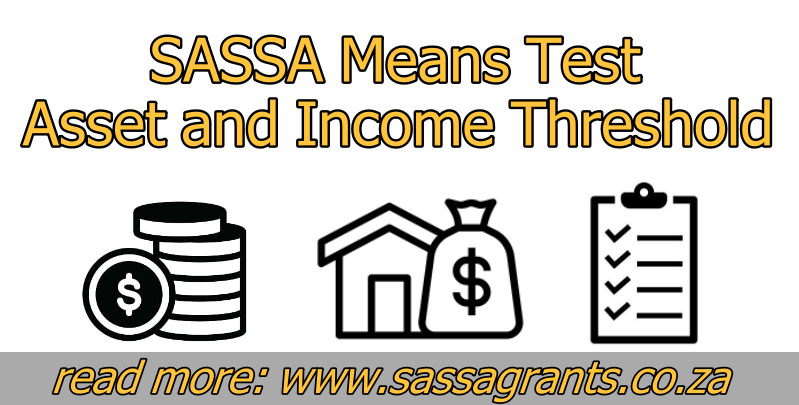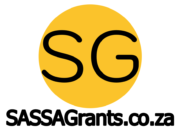SASSA Means Test – Asset and Income Threshold
This page has been updated with the Asset and Income Thresholds for April 2024.
South African Social Security Agency (SASSA) is the national agency of the government, responsible for the distribution of social grants on behalf of the Department of Social Development.
Each month, millions of people across South Africa receive grants to help cover their basic living expenses. Before grants are awarded to recipients, SASSA must ensure that applicants meet all the criteria, and income and asset are one of the criteria which must be assessed. This is to ensure that only the most needy receive grant payments.
Applicants who are married will have their applications assessed with theirs and their spouses’ combined incomes. Incomes will be combined regardless of whether applicants are married in community of property or out of community of property.

Please note that the following asset and income threshold are the current amounts from 1 April 2024. These amounts are subject to change again on 1 October 2024 and we will update this page accordingly.
Keep reading to find out if you qualify for a SASSA grant based on your income and assets:
Maximum income threshold for each type of SASSA grant:
(These values are valid from 1 April 2024)
- SRD grant: you must NOT earn more than R624 per month
- Child support grant: you (the primary caregiver of the child you are applying for) must NOT earn more than:
- R61 200 per year (R5 100 per month) if you are single
- R122 400 per year (R10 200 per month) if you are married
- Foster child grant: there is no income/ asset/ means test applicable for this type of grant
- Care Dependency grant: you (the primary caregiver of the child you are applying for) must NOT earn more than:
- R250 800 per year (R20 900 per month) if you are single
- R501 600 per year (R41 800 per month) if you are married
- Disability grant: you must NOT earn more than:
- R97 320 per year (R8 110 per month) if you are single
- R194 640 per year (R16 220 per month) if you are married
- Older persons grant: you must NOT earn more than:
- R97 320 per year (R8 110 per month) if you are single
- R194 640 per year (R16 220 per month) if you are married
- War Veterans grant: you must NOT earn more than:
- R97 320 per year (R8 110 per month) if you are single
- R194 640 per year (R16 220 per month) if you are married
- Grant-in-Aid: you must NOT earn more than:
- R97 320 per year (R8 110 per month) if you are single
- R194 640 per year (R16 220 per month) if you are married
Applicants for the Older Persons Grant (old age pension), War Veterans Grant and Disability Grant, must keep in mind that the grant amount they will receive depends on their income amount. These grants work on a sliding scale, where a higher income means a smaller grant payment.
Maximum asset threshold for each type of SASSA grant:
(These values are valid from 1 April 2024)
- SRD grant: not applicable for this type of grant
- Child support grant: not applicable for this type of grant
- Foster child grant: not applicable for this type of grant
- Care Dependency grant: not applicable for this type of grant
- Disability grant: you must NOT have assets worth more than:
- R1 438 800 if you are single
- R2 877 600 if you are married
- Older persons grant: you must NOT have assets worth more than:
- R1 438 800 if you are single
- R2 877 600 if you are married
- War Veterans grant: you must NOT have assets worth more than:
- R1 438 800 if you are single
- R2 877 600 if you are married
- Grant-in-Aid: you must NOT have assets worth more than:
- R1 438 800 if you are single
- R2 877 600 if you are married
What is considered an “asset” in terms of the SASSA means test?
The means test will consider the following as “assets”, which will determine whether you qualify for a grant:
- The value of a property or land you or your spouse own (except for the property that you live in) (properties or land that have an outstanding bond registered over it, are deemed to have 0 value)
- Cash in yours or your spouses bank account
- Investments (such as shares or unit trust funds), owned by yourself or your spouse
- Retirement fund: if you have NOT retired from the fund yet, your annuity will NOT form part of the means test
- Retirement fund: if you have retired from the fund, your annuity will form part of the means test
What is considered an “income” in terms of the SASSA means test?
The means test will consider the following as “income”, which will determine whether you qualify for a grant:
- Income from work you do
- Income from a private pension fund
- Income from renting out a room in your house
- Income from renting out any other property you own
- Income from farming or from any business
- Financial support from relatives
- Maintenance received for your child
- Compensation from from UIF, Road Accident Fund or Compensation for Occupational Injuries and Diseases Fund (COIDA)
SASSA will use your combined income net of tax and allowable deductions (such as contributions to a medical scheme), to calculate your grant. You must inform SASSA of any changes to your income and deductions.
Deductions when calculating income – you are allowed to deduct the following:
- Your medical aid payments
- Your UIF payments
- Your income tax paid
- Your contributions to a pension fund or retirement annuity
Important things to note:
- If your income and/or assets are higher than the threshold amount, they will not qualify for a social grant.
- If your spouse already receives a social grant, their grant is NOT counted as income in your application.
- If your spouse has deserted you for more than 3 months, then your marital status will not taken into account, however you will need to submit an affidavit to attest to the desertion.
- Foster Child Grant is the only Social Grant that is NOT subject to a means test.
Find out more about each type of SASSA grant here:
SRD R350 Grant Care Dependency Grant Child Support Grant Foster Child Grant Disability Grant Older Persons Grant Grant-In-Aid War Veterans Grant
You may be interested in reading about:
Types of Grants How to Apply Status Check Payment Dates Jobs & Vacancies Updates & Blog Contact SASSA
QUERIES AND CONTACT
For any further queries, please contact SASSA directly:
Contact the SASSA Toll Free Call centre on: 0800 60 10 11
Contact the SASSA Head Office on: 012 400 2322
Email SASSA Head Office at: Grantsenquiries@sassa.gov.za
Contact details of SASSA offices across the country: SASSA contact details
